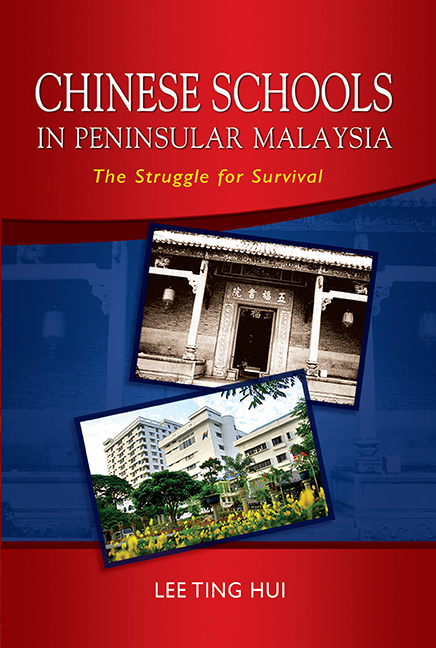Book contents
- Frontmatter
- Contents
- Acknowledgements
- Abbreviations
- Notes on Coverage and Names
- Introduction
- 1 The Years before the Pacific War
- 2 From the Japanese Occupation to Self-Government
- 3 Towards the “Ultimate Objective” of One-medium Education
- 4 One-medium Education under Rukun Negara and the New Economic Policy
- 5 The 1980s: A Decade of Continuing Challenges for the Chinese Schools
- 6 Vision 2020 and the Chinese Schools
- 7 Conclusion: Challenges and Responses
- Glossary
- Bibliography
- Index
- About the Author
5 - The 1980s: A Decade of Continuing Challenges for the Chinese Schools
Published online by Cambridge University Press: 21 October 2015
- Frontmatter
- Contents
- Acknowledgements
- Abbreviations
- Notes on Coverage and Names
- Introduction
- 1 The Years before the Pacific War
- 2 From the Japanese Occupation to Self-Government
- 3 Towards the “Ultimate Objective” of One-medium Education
- 4 One-medium Education under Rukun Negara and the New Economic Policy
- 5 The 1980s: A Decade of Continuing Challenges for the Chinese Schools
- 6 Vision 2020 and the Chinese Schools
- 7 Conclusion: Challenges and Responses
- Glossary
- Bibliography
- Index
- About the Author
Summary
The 1980s saw the rule of two men, Hussein Onn and Dr Mahathir Mohamad. The former vacated his office as prime minister of the country on 16 July 1981 due to poor health and was succeeded by the latter. Under the rule of these two men, Chinese-medium schools in the country had to face continuing challenges.
The Society Amendment Act
In March 1981, Hussein Onn's government presented to parliament a bill to have the Society Act amended. The amendment proposed to have all registered societies divided into two kinds, viz social and political organizations. The former would not have the right to level criticisms against the government or its policies. Only the latter would be so empowered. Although political entities would be so privileged, they must not enter into any liaison with any foreign organizations or receive external aid. The minister of home affairs and the registrar of societies would have the authority to deregister any society contravening these rules or to refuse any society registration. Affected organizations would not be allowed to appeal to a court of law against any such decision, but only to the minister for home affairs himself.
This proposed amendment to the Society Act would emasculate UCSCA, UCSTA, and other similar public organizations. How could UCSCA and UCSTA, which were educational bodies and could be classified as social organizations, defend and promote the interests of Chinese education when they would have their hands and feet tied? Hence in April, these two bodies, together with other Chinese organizations in Selangor, convened a meeting to voice their dissatisfaction with the government's move. The gathering passed four resolutions:
Protest strongly against the proposal to have societies divided into social and political ones;
Protest strongly against conferring power upon the registrar of societies to solely make decisions;
Protest strongly against depriving the right of societies to appeal to the courts; and
Appeal earnestly to the government to widely consult public opinion in the framing of any law which would impinge upon the vital interests of the people in order to keep to the spirit of democracy.
- Type
- Chapter
- Information
- Chinese Schools in Peninsular MalaysiaThe Struggle for Survival, pp. 155 - 186Publisher: ISEAS–Yusof Ishak InstitutePrint publication year: 2011



